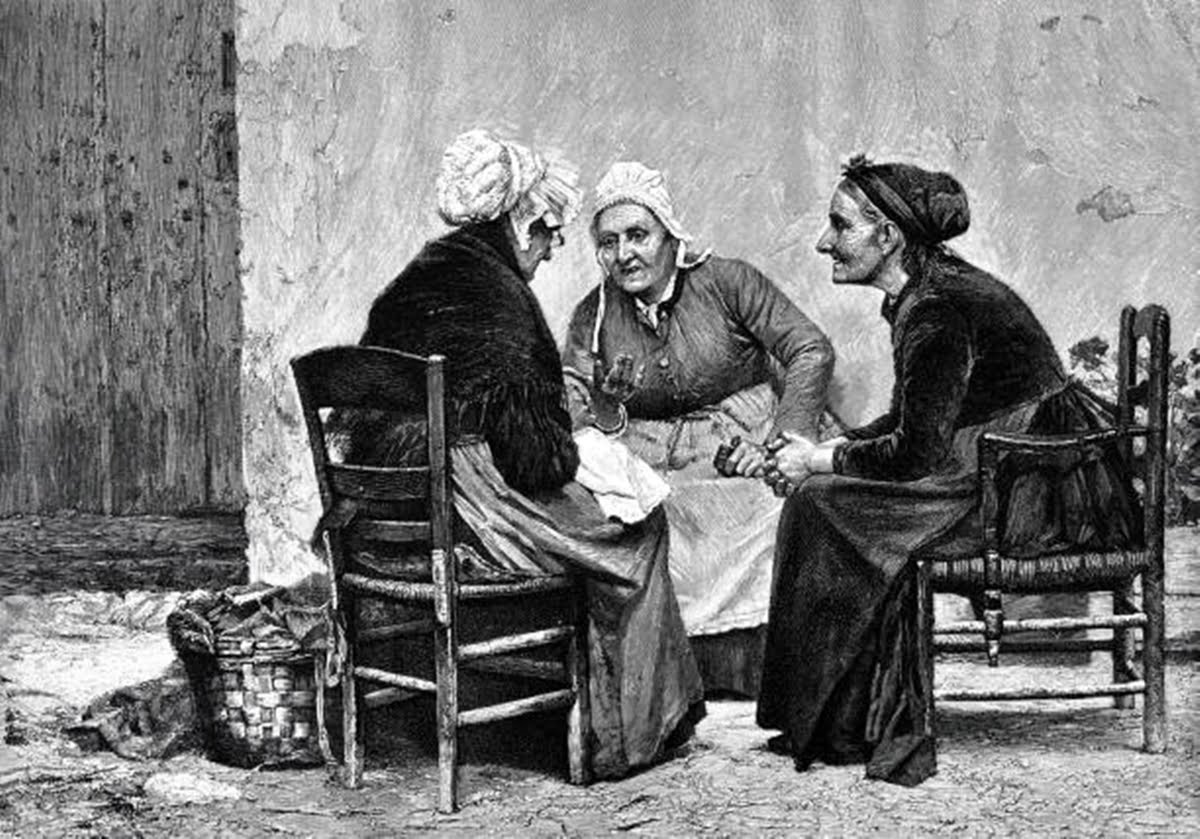Trigger Warning: Disturbing Imagery
When we speak of gossiping, it is always women who come to our minds at first. From classrooms to bathroom stalls, there are locations associated with the act, one that is inherently seen as negative and harmful. Nevertheless, have we all not “gossiped” from time to time and enjoyed it? Has it not provided us with previously unknown, but crucial information? However, standing in contrast to these personal experiences is the popular narrative of gossip as a bad practice.
Origins of Gossip
The term “gossip” has been around since the Medieval period. However, it did not always hold the negative connotation that it does now. Initially, it signified conversations between women that largely promoted solidarity and community-building.
According to Silvia Federici in the book Witch, Witch-Hunting, and Women, “Traces of the use of the word are frequent in the literature of the period. Deriving from the Old English terms God and sibb (akin), ‘gossip’ originally meant ‘godparent,’ ie., one who stands in a spiritual relation to the child to be baptized. In time, however, the term was used with a broader meaning. In early modern England, the word ‘gossip’ referred to companions in childbirth not limited to the midwife. It also became a term for women friends, with no necessary derogatory connotations.”
Also read: Eating As An Act Of Feminist Resistance: Assertion Of Need & Leisure Through Ingestion
Gossip as Evil
It was towards the end of the sixteenth century that gossiping started to become associated with negativity. And not surprisingly, there were several societal factors that influenced this change, like the witch hunts. According to Silvia Federici, the change came along with the strengthening of patriarchal forces and mechanisms, especially in the sphere of the family and the exclusion of women from public activities. Coupled with the lack of means of livelihood for women, they began to be confined more and more to their homes, being demanded of ultimate obedience and servitude to their husbands.
In fact, this was downright imposed through proclamations and even contraptions. In 1547, a proclamation was issued “forbidding women to meet together to babble and talk,” ordering husbands to “keep their wives in their houses.” The “scold’s birdle” was one of the many contraptions that were invented to forcefully and physically keep women from speaking. Also known as the witch’s birdle or the gossip’s birdle, it was used as a form of punishment and often had a spike where the tongue would be placed.

Understandably, not only did this cause physical pain but immense psychological trauma. Gradually, therefore, the context of the word “gossip” began to change entirely to accommodate more sinister intentions. Through the centuries, the word began to be weaponized even more against women – to accuse them of spinning tales, and of turning against one other instead of forming companionship. Pop culture portrayals in the 20th century and early 21st century, of “bitchy” girls gossiping were largely influenced by such developments as well.

Misogynistic Portrayal of Gossip
Gossiping today is always associated with women even though it was not always so. The demonization of gossiping has also to do with the misogynistic portrayal of it that took place through the centuries because as we saw, long gone are the days when gossiping simply meant to get together to talk.
When men got together to talk, it was a dignified meeting that was seen as productive and thought-provoking. Subjects that were deemed as “important” such as sports and politics were thought to be discussed during these sessions. On the other hand, when women got together to talk, whether it was over their garden fences or while shopping, it was thought to be idle (perhaps the origin for “idle gossip”), inconsequential and essentially, detrimental to the development of society.
It is perhaps fueled by a misogynistic fear that if women get together and start talking, they can spread pertinent information that can potentially harm the misogynistic intentions of men. When girls get talking about their experiences, their issues or give advice, it can be harmful to predators because they might just get exposed. Gossip was and is, therefore, also essential in creating a network of information.
It is perhaps fueled by a misogynistic fear that if women get together and start talking, they can spread pertinent information that can potentially harm the misogynistic intentions of men. When girls get talking about their experiences, their issues or give advice, it can be harmful to predators because they might just get exposed. Gossip was and is, therefore, also essential in creating a network of information crucial for women, but harmful to the intentions of men. For women, it is a tool to protect each other. It is also helpful for queer networks, to talk to each other and form bonds of communion on small levels as well as big.
Also read: Why Is Women’s Laughter Always Loud, Immoral, and Unsanskari?
The Dilemma of Gossip
Nevertheless, it is crucial to remember that gossiping can also become harmful to women themselves if we use it to censor, police or stigmatize each other. Fear of people talking, of people gossiping behind our backs, is very real. Therefore, it is essential to understand how gossip can help us, instead of using it to tear each other apart. After all, it is ultimately the larger patriarchal force that stands to be served through the use of gossiping as an evil tool.
As Reina Gattuso rightly observes, “At best, at most revolutionary, we can understand gossip as weaponized intimacy — as the power of marginalized communities to build guerilla information networks to keep ourselves and each other safe. In order to do this, we need to help each other discard forms of talking and thinking that blame each other and ourselves for our oppression, so that we may together have more space to thrive and grow.”
Women and their speech have long been demonized, especially in the private sphere. It is always supposedly them who are fishing for rumours, starting gossip, being homewreckers. But how much of these perpetrated facts originate just for the benefit of the patriarchy? And how long should we let it continue to do so?
Understanding the mechanics of what exactly the word gossip connotes can help gain a wider perspective and subvert it to our benefit. Women and their speech have long been demonized, especially in the private sphere. It is always supposedly them who are fishing for rumours, starting gossip, being homewreckers. But how much of these perpetrated facts originate just for the benefit of the patriarchy? And how long should we let it continue to do so?
Sudarshana Ganguly is currently pursuing a Bachelors in English from Jadavpur University. When she’s not procrastinating or falling victim to impulse retail therapy, she can be found learning new languages, fangirling over her favourite kpop acts and daydreaming about herself as a future magazine editor. She is passionate about fashion, especially about how it can be made more sustainable and inclusive. You may find her on Instagram.
Featured image source: istockphoto
About the author(s)
Sudarshana Ganguly is currently pursuing a Bachelors in English from Jadavpur University. When she’s not procrastinating or falling victim to impulse retail therapy, she can be found learning new languages, fangirling over her favourite kpop acts and daydreaming about herself as a future magazine editor. She is passionate about fashion, especially about how it can be made more sustainable and inclusive.






This was such an interesting read! ❤️